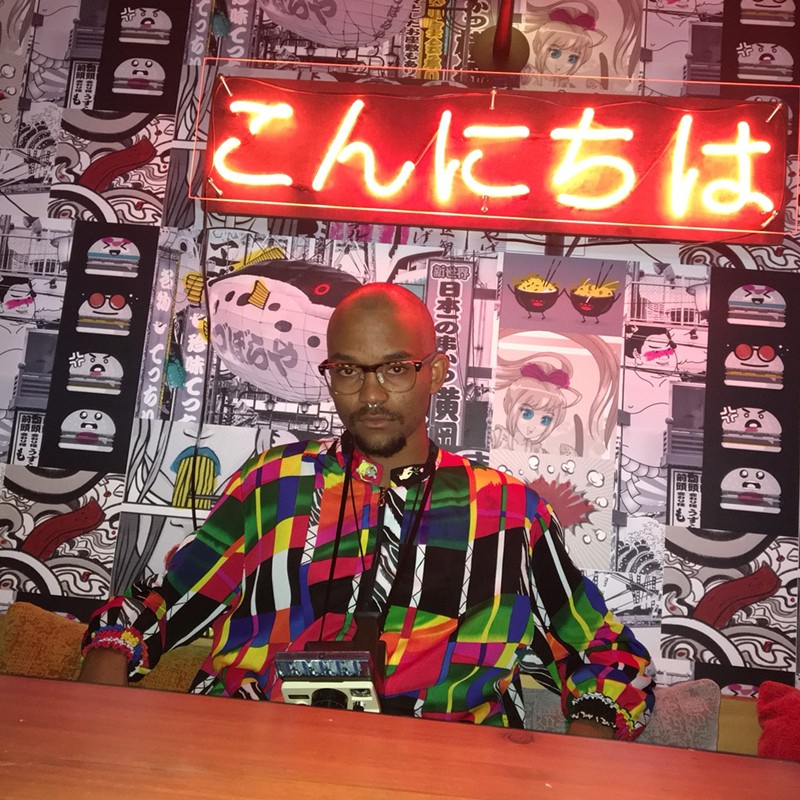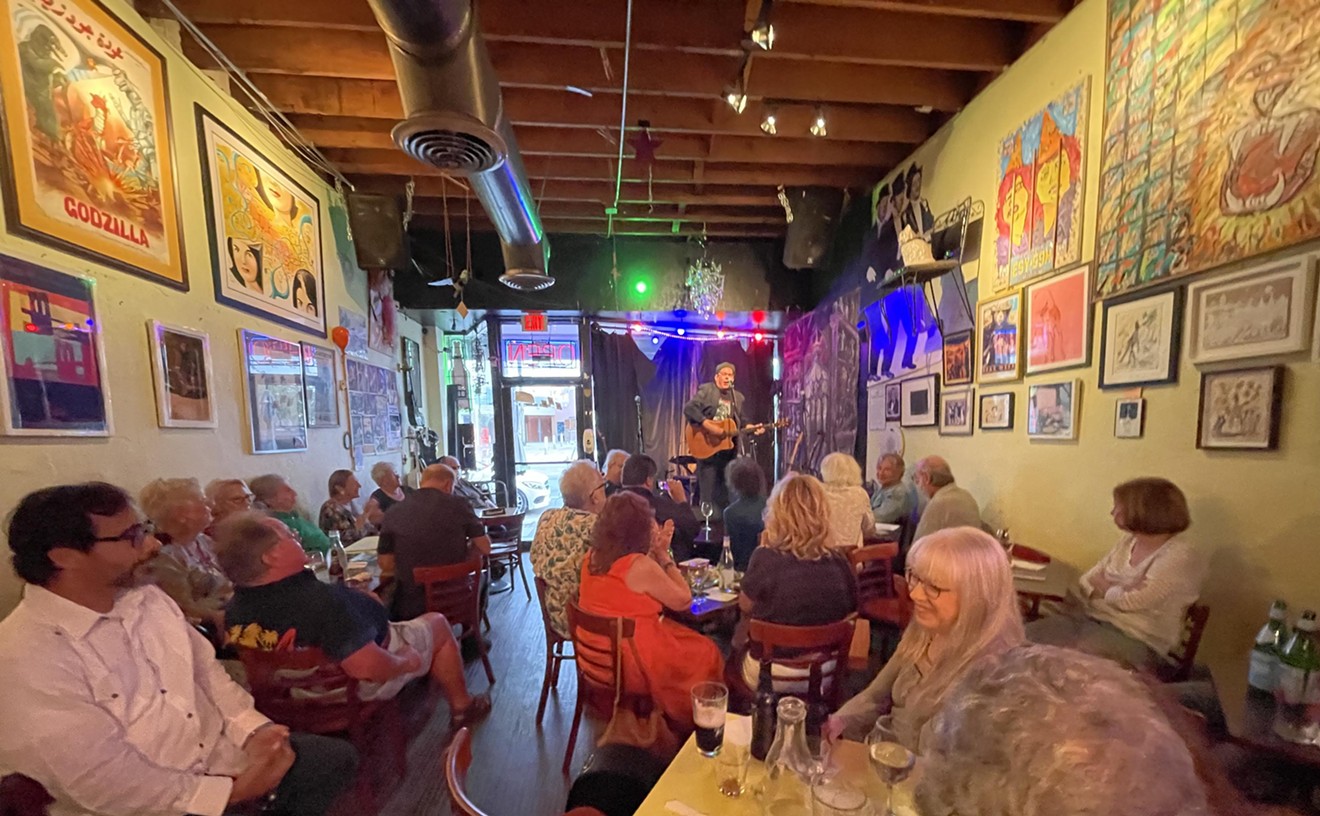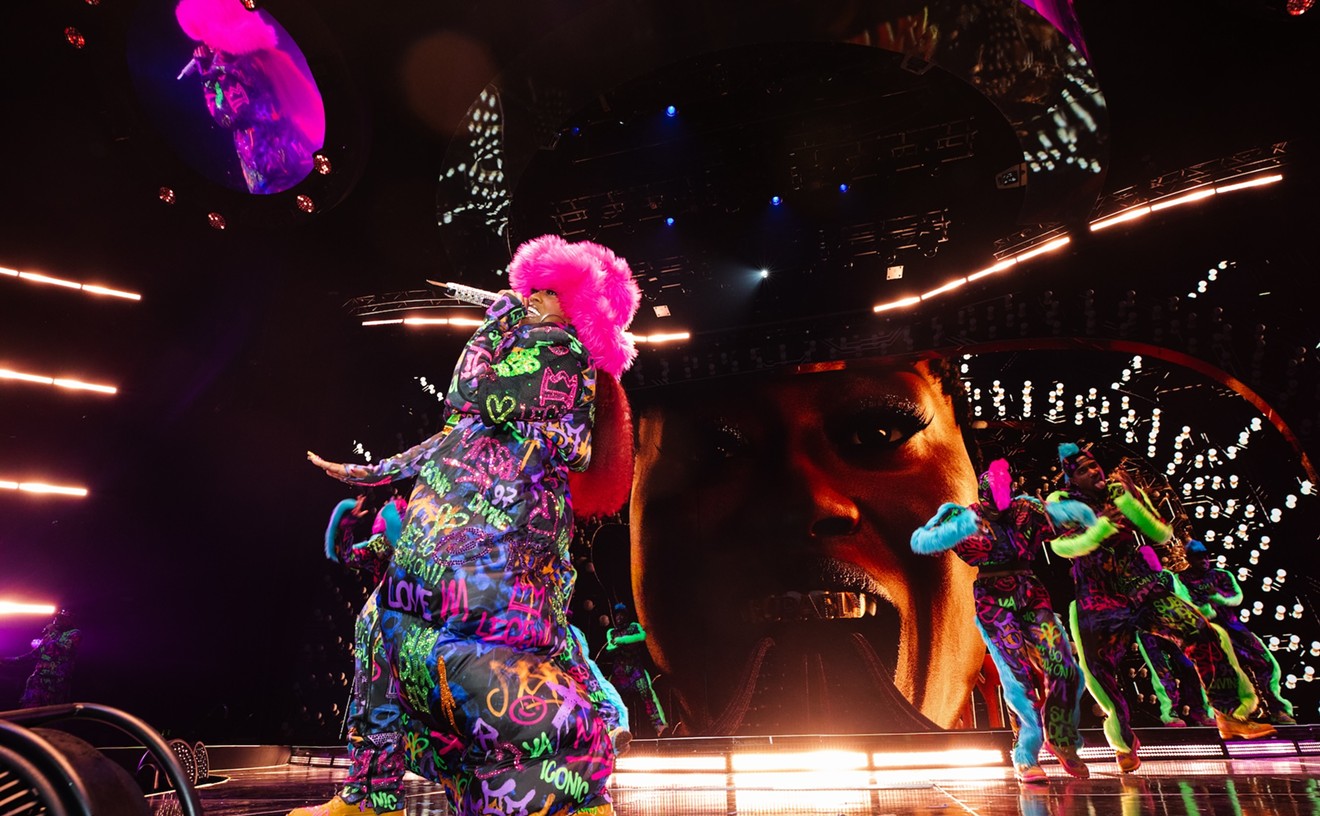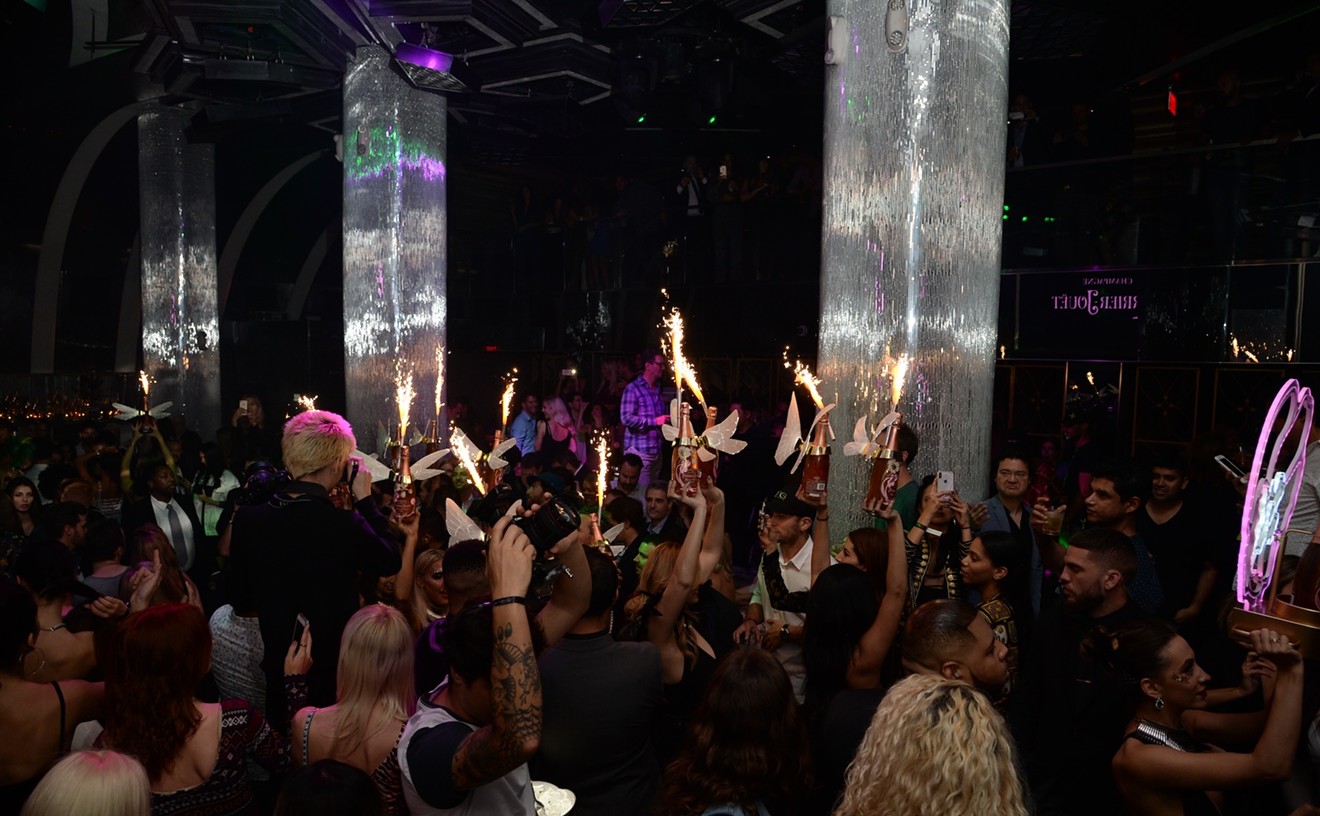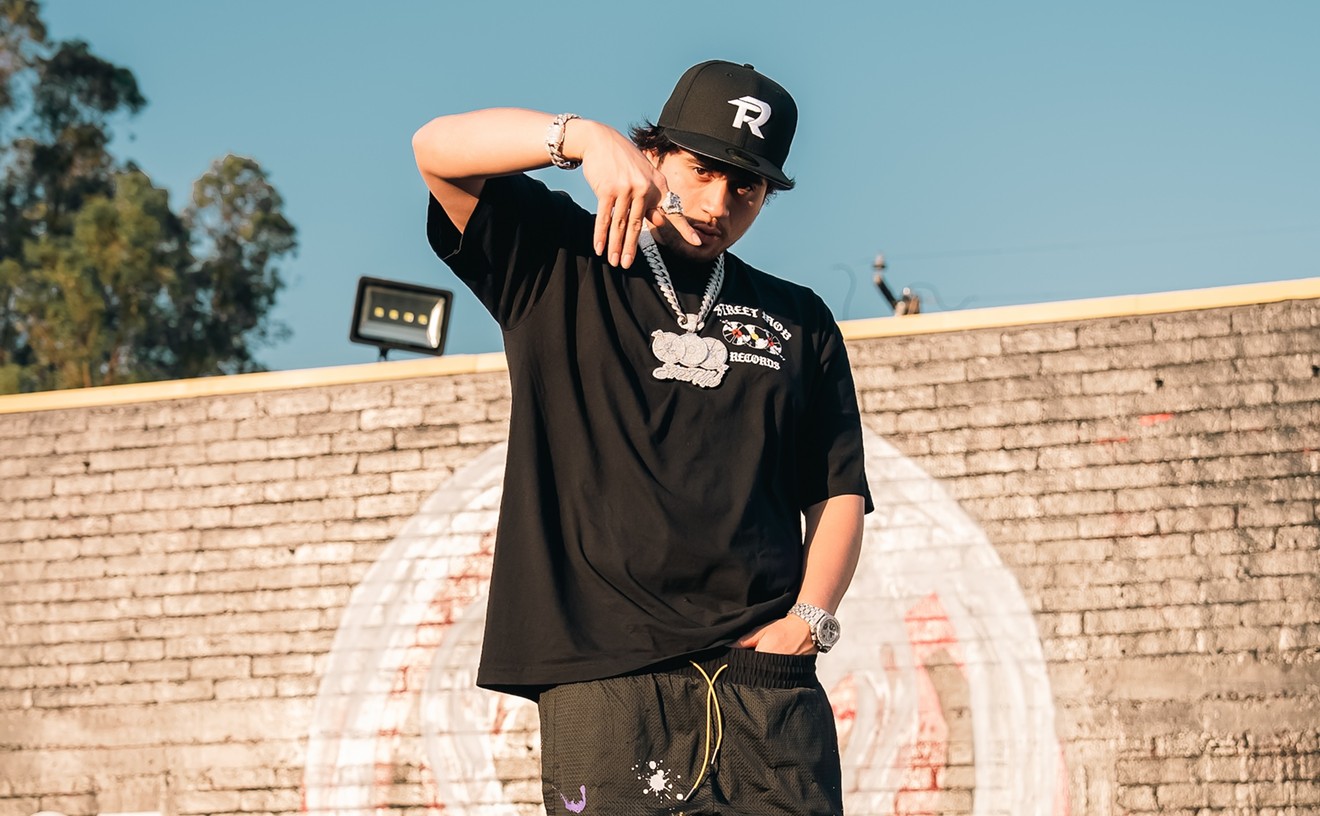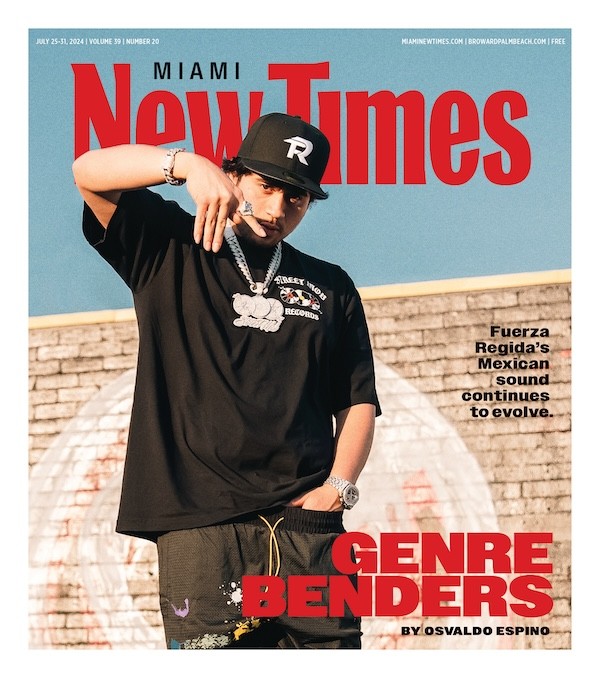By day, Joshua Alexander Hicks, age 21, works at a call center where he asks people's opinions about Florida's political candidates. By night, the West Kendall native transforms into Ashiyushi, Miami's "one-man synth-funk" band.
Those who have spent time in South Florida's burgeoning underground electronic music scene might recognize Ashiyushi's unique style of lo-fi, smooth beats blended with dreamy synths and familiar sounds of the beloved videogame Super Smash Bros. and other parts of the Nintendo universe — think Yoshi's signature "Wah."
Hicks takes a radically different approach to creating lo-fi music. "I make the most spectacular analog beats," he says. "My full title, I would say, is analog-computing-beat synthesizer-meister." In today's landscape of Ableton Live, FL Studio, and Logic Pro, an analog beatmaker is a rare find. At an Ashiyushi show, audiences can expect a visual gear feast — a small table overflowing with synthesizers, drum pads, and keyboards.
Hicks didn't set out to become Miami's premier analog beatmaker. Rather, it happened out of circumstance and necessity. "I take all I've known from music and try to create the most fluid beats for what I have since I don't have a good laptop."
Music was always a core part of Hicks' life. He always knew he wanted to pursue it as a career. "I first got into music through guitar," he says. "It struck a chord in me when I was about 11. At the time, I was taking up as much time as I could, learning what any other beginning guitarist would be learning." He developed an ear for metal and "really hard rock." As he grew older, he found the genre wasn't fulfilling his artistic needs. At the age of 16, he put down the guitar and picked up the alto saxophone — then promptly put it back down. He said he was beginning to get good at it but then grew bored with it.
During his junior year of high school, Hicks discovered artists such as Toro y Moi and Neon Indian, which drove him to pursue electronic, synth-oriented music. "I was on YouTube looking for different kinds of synth gadgetry," he says. "I came across a tutorial for the Korg Kaossilator Pro, and I didn't even have the thing in front of me, but I watched the whole video. I thought it was so cool."
He was so entranced by the instrument he decided to purchase one before he came up with a stage name, which would eventually be "Ashiyu." "I was first making beats with just the Kaossilator. When I wasn't Ashiyu yet, I would just make little disco tracks and lengthy improvised things you can only do on a Kaossilator Pro," he says. "I still incorporate it into live sets." When his friends learned he was making music with just that one pad, they suggested he buy a Microkorg — a small but powerful synthesizer and vocoder — to accentuate his beats.
After diligent saving his money, he eventually purchased the Microkorg and began teaching himself "synthesis, key composition, more theory." With these two tools and his project formally named, he began to make tracks out of loops. He wanted to share his songs with others but didn't have any proper recording software. "I'd use my phone in a shoe in a corner of my room and recorded whatever I had. When I was Ashiyu, I threw a couple of those beats on SoundCloud, and the response was actually incredible."
Soon he was offered an opening slot at the closing of Tobacco Road. Armed with his Kaossilator Pro and Microkorg, he played his set as Ashiyu. "The night didn't go how I expected," he says, "but people were digging my set. I had one of my friends come out with a guitar, and it was very live."
Hicks thinks that his performance at Tobacco Road was relatively successful but that his stage name was still lacking something. How he came to be Ashiyu and then Ashiyushi is an interesting story. "I'm really inspired by Japanese culture — every name means something," he says. "I was thinking about Ash from Pikachu, so that became 'Ashiyu.' I was also thinking about 'Atreyu,' which was this sick screamo-metal band I used to listen to back in the day." He kept that name from his junior year to the beginning of his senior year. "One day, I was walking down the hall at school. This guy came up to me, and he knew I was making music as Ashiyu, so he said, 'Ay! Ashiyushi!' and I was like, 'By God, you've got it!' Unknowingly, adding that 'shi' at the end of my name means that he's bestowing great honor on to me." Thus, Ashiyushi was born.
As Ashiyushi, Hicks is working on numerous projects, merch development, and branding strategies. He also performs monthly as a resident of Space Mountain's BPM — a night devoted to showing the best of South Florida's beat scene — and is creating a full-length album. "I'm planning to put on some beats of mine that people may have heard before but are now mastered in full," he says. "I think when people hear this, they'll be hungry for more."
He's also been collaborating with Miami-based saxophonist Keanu Yarima. "He's the most ultimate jazz cat I feel I'll ever know and have the pleasure of working with," he says. The two performed together along with singer Nova Quartz at RAW Pop-Up in May. The show inspired Hicks to incorporate more instrumentation into his live sets. "Even though I love doing analog sets, there's this part of me that needs to be doing this with a band. There's a part of me that loves live music and sharing it with other people."
While Hicks begins to develop a live band for the Ashiyushi project, he's also had time to reflect on the developments in South Florida's lo-fi underground music scene since his involvement began in 2013. Audiences resisted lo-fi music at first. "When people get outside of their comfort zone and listen to one really nice, repetitive beat that has subtle changes in it, they freak out, don't understand it, or reject it — they dismiss it," he says. "But lately, I feel like people are becoming more open-minded to this music. I see a lot of people sharing or reposting songs by lo-fi artists or beat musicians in general."
A small but strong community of beatmakers is working hard to get its music heard by the wider Miami community, he says. And because of a new interest from audiences, he believes the scene will continue to expand and develop in a positive direction.

Audio By Carbonatix
[
{
"name": "Air - MediumRectangle - Inline Content - Mobile Display Size",
"component": "19274298",
"insertPoint": "2",
"requiredCountToDisplay": "2",
"watchElement": ".fdn-content-body",
"astAdList": [
{
"adType": "rectangle",
"displayTargets": "mobile"
}
]
},{
"name": "Editor Picks",
"component": "17482312",
"insertPoint": "4",
"requiredCountToDisplay": "1",
"watchElement": ".fdn-content-body",
"astAdList": [
{
"adType": "rectangle",
"displayTargets": "desktop|tablet"
},{
"adType": "rectangle",
"displayTargets": "desktop|tablet|mobile"
}
]
},{
"name": "Inline Links",
"component": "18711090",
"insertPoint": "8th",
"startingPoint": 8,
"requiredCountToDisplay": "7",
"maxInsertions": 25
},{
"name": "Air - MediumRectangle - Combo - Inline Content",
"component": "17482310",
"insertPoint": "8th",
"startingPoint": 8,
"requiredCountToDisplay": "7",
"maxInsertions": 25,
"watchElement": ".fdn-content-body",
"astAdList": [
{
"adType": "rectangle",
"displayTargets": "desktop|tablet"
},{
"adType": "rectangle",
"displayTargets": "desktop|tablet|mobile"
}
]
},{
"name": "Inline Links",
"component": "18711090",
"insertPoint": "8th",
"startingPoint": 12,
"requiredCountToDisplay": "11",
"maxInsertions": 25
},{
"name": "Air - Leaderboard Tower - Combo - Inline Content",
"component": "17482313",
"insertPoint": "8th",
"startingPoint": 12,
"requiredCountToDisplay": "12",
"maxInsertions": 25,
"watchElement": ".fdn-content-body",
"astAdList": [
{
"adType": "leaderboardInlineContent",
"displayTargets": "desktop|tablet"
},{
"adType": "tower",
"displayTargets": "mobile"
}
]
}
]

